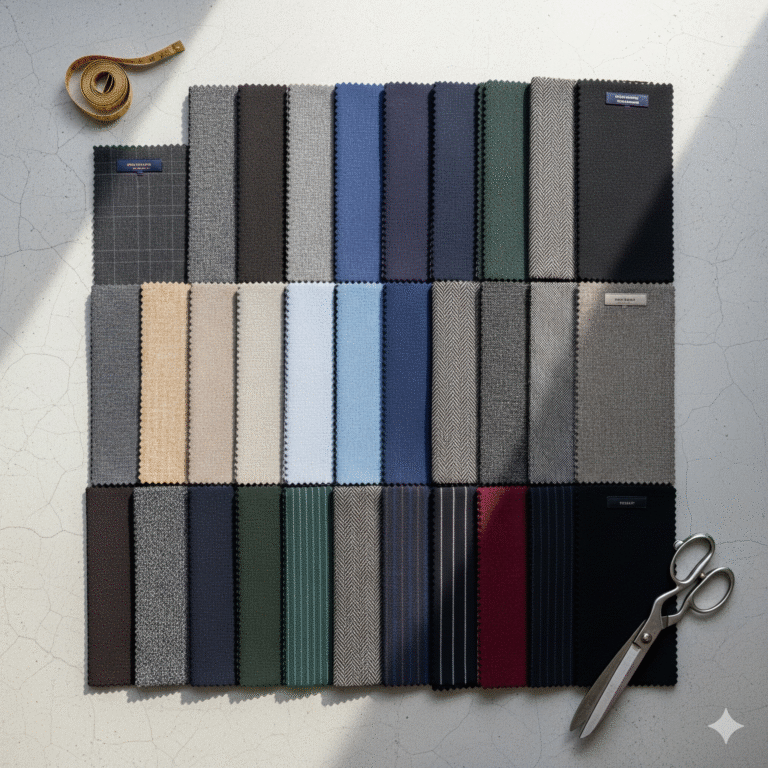A perfectly tailored suit is a work of art, but the story of that suit begins long before the first stitch is ever made. It starts with the cloth. The right fabric for a suit not only dictates how it looks and feels but also how it performs, whether you’re in a crucial business meeting or celebrating under the summer sun.
For decades, we’ve had the privilege of working with countless fabrics, understanding their unique personalities and guiding our clients to the perfect choice. In this guide, we’ll share that experience with you, exploring the world of suit fabrics so you can make a choice that feels as good as it looks.

The Classics: Understanding Core Suit Fabrics
While the options are vast, a few key players form the foundation of a gentleman’s wardrobe. Understanding these will give you the confidence to choose the right material for any occasion.
Wool: The Versatile King
If there is one indispensable fabric for a suit, it is wool. It’s the cornerstone of tailoring for a reason. As a natural fiber, it breathes exceptionally well, keeping you comfortable in a wide range of temperatures. It’s also remarkably resilient, resisting wrinkles and holding its shape beautifully throughout the day.
- Worsted Wool: This is the smooth, strong, and durable wool you’ll find in most business suits. It’s spun from longer fibers, giving it a refined finish that’s perfect for formal settings, including a respectful funeral suit.
- Flannel: For cooler weather, flannel is a wonderful choice. It’s a softer, brushed wool that provides exceptional warmth and a touch of texture, making it an ideal winter suit.
- Tweed: Traditionally the fabric of the countryside, tweed is a rugged, textured wool that is warm, durable, and full of character. It’s perfect for a more relaxed, academic look in the autumn and winter.
Cotton: The Breathable Alternative
After wool, cotton is perhaps the most common suiting fabric. It’s lightweight, soft, and breathes wonderfully, making it a fantastic choice for warmer climates. A well-made cotton suit is the cornerstone of a smart-casual wardrobe. However, be mindful that cotton does wrinkle more easily than wool, so it requires a bit more care to keep it looking crisp. It’s the perfect choice for a stylish casual suit.
Linen: The Quintessential Summer Suit
When the temperature rises, nothing compares to the cool comfort of linen. It is the undisputed king of the summer suit. Woven from the fibers of the flax plant, it is incredibly lightweight and breathable, allowing air to circulate freely. Linen is famous for its tendency to wrinkle, but we encourage our clients to embrace this as part of its charm—it lends a relaxed, effortless elegance perfect for a beachside wedding or a European holiday.

Silk: A Touch of Luxury
For millennia, silk has been synonymous with luxury. It’s a beautiful fabric for a suit, offering incredible softness, a subtle luster, and surprising breathability. While a 100% silk suit is a rare and delicate garment, silk is often blended with wool to create a fabric with a beautiful drape and a luxurious feel. These blends are perfect for creating a powerful and elegant dinner suit or special occasion wedding suits.
Suiting for the Occasion: Making the Right Impression
The event you’re attending is just as important as the season when selecting your fabric.
- Wedding Suits: The right fabric depends entirely on the wedding’s setting. A lightweight linen or cotton blend is perfect for a daytime or destination wedding. For a more formal, evening affair, a luxurious wool-silk blend or a classic, high-quality worsted wool will ensure you look the part.
- Dinner Suit / Formal Events: This is where you can embrace more luxurious textures. Velvet is a fantastic choice for a smoking jacket or a full dinner suit in the winter, offering a rich, deep color and a plush feel. A fine mohair or cashmere blend also elevates the look, providing a subtle sheen and unmatched softness.
- Funeral Suit: Somber occasions call for respectful and understated choices. A dark charcoal or navy worsted wool is the most appropriate option. It’s classic, formal, and carries the right tone of seriousness.
- Casual Suit: For a relaxed yet put-together look, cotton, linen, and even corduroy in the cooler months are excellent choices. They are less structured than their formal counterparts and offer a greater degree of comfort for everyday wear.
Have a read onr blog post on “The Essential Guide to Suit Fit and Style.“
A Note on Blends and Synthetics
In your journey, you will encounter suits made from synthetic fibers like polyester or blends. While these can be more affordable and wrinkle-resistant, we find they lack the essential breathability and refined feel of natural fibers. They can trap heat and often have an artificial sheen. When possible, we always guide our clients toward natural fabrics, as the comfort and elegance they provide are truly a worthwhile investment.
Ultimately, the best fabric for a suit is one that serves your needs, suits the occasion, and makes you feel confident. And remember, even the most luxurious fabric in the world won’t shine if the fit isn’t perfect.




